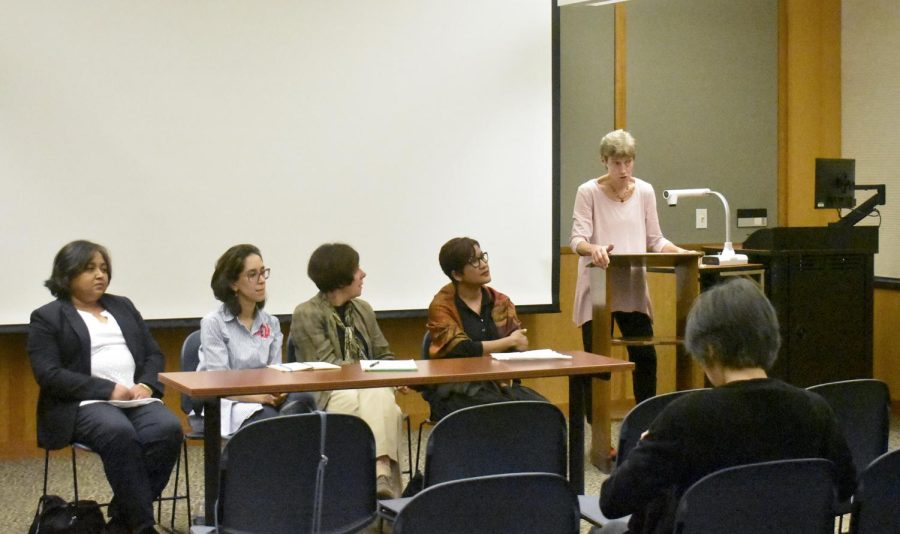Women of Kent conference kicks off with Women of the World panel
September 14, 2018
A diverse group of Kent State women — who originated from all over the world — gathered at the Kent Free Library on Wednesday to discuss important issues like culture differences, education and their experiences moving to Kent.
The panel was funded by the Kent State History Department, the Kent State Women’s Studies Program and the Ohio Humanities Council.
The panel included four distinct women: Suwatana “Pla” Rockland, Françoise Massardier-Kenney, Loubna Bilali and Dr. Sanhita Gupta. The panel was moderated by Professor Suzanne Holt.
The panel began by having each woman introduce herself and summarize their accounts of moving from the country they grew up in to Kent.
Rockland began by discussing her beginnings in Thailand. There, she became a dancer and business owner. She also found a love for theater after she traveled abroad and saw “The Phantom of the Opera.”
Rockland came to the U.S. after she married her husband. She originally moved to Colorado and spent time teaching in Arizona. Eventually they settled in Kent after her husband received his position at Kent State.
Here, she began studying costume design and will be finishing her degree this school year. “Yes, I am a dancer. Costume is my new career,” Rockland said.
Professor Massardier-Kenney has been in Kent since the late 1980s. She is currently a professor of French, director of the Institute for Applied Linguistics, and co-director of the Global Understanding Research Initiative at Kent State University.
She remembers Kent State was still recovering from the trauma of the May 4 shooting at the beginning of her time at Kent State.
Massadier-Kenney also discussed the differences between the U.S. and her home country of France.
“I was not really prepared to figure out how American culture differed from my culture,” she said. Massadier-Kenney said she left France for practical and personal reasons.
“It was much easier for a French person to find a job in American academia then for an American academic to find a job in France,” Massadier-Kenney said.
She said Americans usually seek consensus from peers, while the French aren’t afraid to disagree when having conversations. She added that America is more of an individualistic society, while France and many others are more collectivist or community based.
“One thing also, I learned from being in a place like Kent is that the geography of your environment has a profound impact on the way you think,” she said.
Loubna Bilali, an assistant professor of translation studies at Kent State, originated from Morocco and has been in Kent for the past 10 years.
“Kent to me is not that it feels like home, but to me it is home,” Bilali said. She credited Kent State for helping her learn to live on her own and thinks the amount of diversity here is amazing.
Bilali was amazed by the relationship between professors and students that varied greatly from the relationships professors and students had back home.
She recalls an emotional moment that amazed her when she asked a professor a question and he walked all the way to her and squatted down to listen to her. “Professors are there for you,” she said.
Sanhita Gupta, a professor at Kent State Geauga, grew up in India where it was still changing after it gained its independence from Britain. She was brought up in a strict culture as she went to school at a British convent.
She came to Ohio after her husband got a fellowship at the Cleveland Clinic. She wasn’t ready to write her Ph.D. thesis, so she followed him here and took her GRE.
She said that she loves coming to work. “When you’re dealing with young people, your mind always stays young,” she said.
During the second portion of the panel, the women discussed more about their culture shocks, women’s rights and the differences between the city of Kent and Kent State.
Most of the women said that in their cultures women are under men or are at least expected to fill more traditional roles.
Moderator Holt — who has been in Kent since the late 1970s — mentioned how there is a big difference between the values of the city of Kent and Kent State.
While there was only seven in attendance, the organizers would like to grow this conference to be much bigger in the future.
Megan Shovestull is the humanities reporter. Contact her at [email protected].












